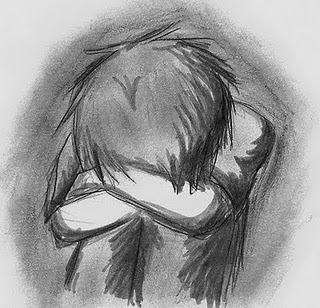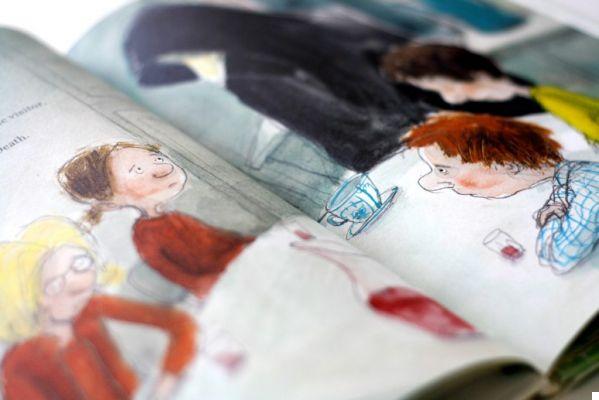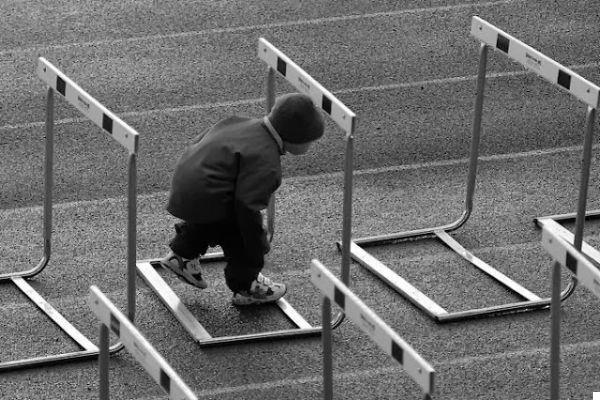 An oyster that has not been injured cannot produce pearls. Pearls only grow when a foreign body, such as a grain of sand, manages to penetrate the oyster. At that point, the oyster activates defense mechanisms and produces a substance that covers the foreign body with several layers. This substance is mother of pearl. Therefore, a pearl is the result of a healed wound, of the oyster's struggle to protect itself.
An oyster that has not been injured cannot produce pearls. Pearls only grow when a foreign body, such as a grain of sand, manages to penetrate the oyster. At that point, the oyster activates defense mechanisms and produces a substance that covers the foreign body with several layers. This substance is mother of pearl. Therefore, a pearl is the result of a healed wound, of the oyster's struggle to protect itself.Resilience follows a similar process
There are people who cultivate resentment, anger and bitterness when attacked. Therefore, their wounds remain open even with the passage of time, causing suffering and pain. Other people manage to overcome the situation by superimposing several layers of a substance that acts as a balm on the wounds; the substance is made up of acceptance, forgiveness and love. Thus, not only does the wound heal faster but they also become stronger.This is resilience, the ability to face adversity and come out of it strengthened, to grow even thanks to setbacks and bring out the best in ourselves in the most difficult moments. Indeed, resilience doesn't just involve facing a problem, but also learning from it and growing as a person, promoting some of our best qualities.Resilience can be a matter of life or death
Resilience not only does it help us cope with the worst of times, it not only has a positive impact on our state of mind, but it also affects the way the body fights against disease. London, they found that how we deal with the disease affects its course. In their study they could see that, when two people have the same initial clinical condition, those who face the disease with a fatalistic attitude and despair have a worse prognosis, while those who face the disease more resiliently and do not give up have a Better prognosis. Why? The answer, or at least part of it, comes from another study, this time conducted at the University of Cambridge. Everything seems to indicate that the resilient process stimulates the production of DHEA. It is a hormone that has been renamed the "resilience hormone" because it regulates the levels of cortisol, a stress hormone that is also the precursor of inflammatory processes. In fact, it has been noted that people with low DHEA levels are also more prone to suffering from depression and post-traumatic stress disorder, so being more resilient not only helps us put a good face on bad luck, it also plays a role. an important role in our health. The good news is that resilience is not an innate trait but it can be developed. We can all learn to be more resilient. Over the past few decades, several studies have been carried out to find out what resilient people have in common. The results revealed these characteristics and ways of behaving:1. They have a highly developed perception of their "self" People who are able to develop a very strong perception of their "I", know who they are and what is important in their life and can cope better with adversity, because they are less sensitive to external influences. They are people who know their strengths and limitations very well and are able to find strength within themselves, an inner strength that helps them avoid negative criticism and overcome obstacles. These people are aware that, even if the road is uphill sometimes, it is they who decide their fate.2. They know how to make the most of every situationResilient people are not naive optimists, but they develop realistic optimism. They are aware of their potential and the resources they have at their disposal, but at the same time, they have an optimistic outlook. These people know that situations are not entirely positive or negative, so they strive to find the positive even in the midst of adversity. When things go wrong, the resilient person tries to learn a lesson. Indeed, a resilient person never loses and never fails, but rather always learns something.
3. They look to the futureResilient people often have a very pragmatic outlook on life. While most people waste time crying over spilled milk, resilient people look to the future. These people are aware that no matter how much the wound hurts, time heals everything. They have the ability to overcome current adversities and look to the future, thus gaining a more complete picture of the situation that allows them to see it in perspective.
4. They are very flexibleResilient people have a very clear concept of themselves and know their goals, but they are also very flexible in the face of change. In the face of a storm they do not stiffen like oak, but bend like willow. They can adapt their plans to new circumstances without clinging to the past, and are able to get back on the road very quickly. Since they do not cling to a single solution, the universe of possibilities available to them is much larger.
5. They are persistent in carrying out their purposesResilient people change the path but not the destination. In fact, if there is one thing that characterizes them, it is their enormous perseverance and tenacity. These people know very well where they want to go and strive to do so. Their secret lies in not fighting lost battles, they don't fight windmills but let themselves be carried by the current. These people are aware that they cannot decide the direction of the wind, but they know that they can adapt their sails to make the most of it.
6. They face life with ironyOne of the most important characteristics that distinguish resilient people is their sense of humor. In fact, they are not only able to laugh at adversity but also at themselves. In this way the smile turns into an ally that allows them to remain optimistic when everything around them seems lost. However, these people never make fun of others, their sense of humor is intelligent and critical, it is not intended to minimize the situation, but only to play down and release negative emotions.
7. They cultivate acceptanceTraumatic events that have not been emotionally processed continue to hurt us. In fact, it has been found that traumatic experiences and those we have already accepted are stored in different parts of our brain and, when we evoke them, they cause us different emotions. For this reason, resilient people strive to cultivate acceptance. These people feel the pain of the wound, but they don't try to deny or suppress it, they accept it. Resilient people reflect on negative experiences, in order to understand them, accept them and find a place for them within their "I". This way they can turn the page more quickly.
8. They accept uncertaintyOne of the biggest sources of tension and stress is trying to control every situation. When something gets out of hand we are assailed by uncertainty. For this reason, resilient people choose to embrace uncertainty, understanding that there are answers to everything and that sometimes bad things happen to good people. These people do not torture themselves by looking for an explanation they cannot find, but rather accept the uncertainty that accompanies any change and try to manage it in the best possible way.
9. They have confidence in their abilitiesResilient people are not superheroes. And they know it. However, they trust their skills and, above all, their ability to cope with adversity. Faced with an obstacle, the resilient person may not have the necessary skill or knowledge to face it, but this does not discourage him, on the contrary, he accepts the situation as if it were a challenge, because he is confident that he can face it in the best possible way by getting out of it. strengthened. Resilient people have self-confidence, they never believe they will do things perfectly, but they know they will do their best. And that's enough for them to find the strength they need.
10. Surround themselves with positive peopleIf there is one thing that distinguishes resilient people, it is that from an early age they know how to surround themselves with positive people who can support them when they need it most. Resilient people are independent and take pleasure in facing challenges alone, but they know exactly when it's time to ask for help. They are aware of the importance of cultivating friendships and choosing carefully the people who can fit into their closest circle. It's like they have a sixth sense for detecting toxic people and keeping them at a distance. This feature allows them to create a strong support network that will support them in the most difficult moments. Always remember the words of Viktor Frankl: "The man who stands up is even stronger than the one who never fell". This psychiatrist, who was imprisoned in a Nazi concentration camp, knew exactly what he meant.

























